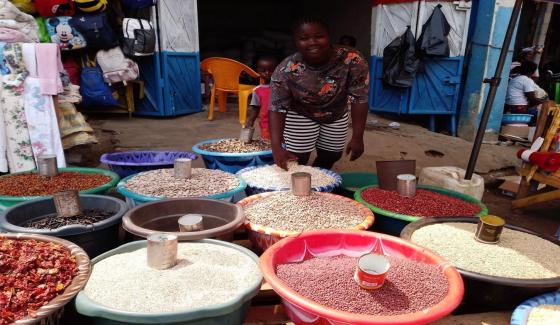Liberia: Women in Agribusiness Struggle with High Exchange Rate

Many women in the agribusiness sector are said to be struggling as a result of the increase in the rate of the United States dollar against the Liberian dollar.
Women doing agribusiness told the Daily Observer that they are buying the United States dollars at a very high rate, which adversely affects their profits.
In recent years, the government of President George M. Weah has worked to keep the United States dollars stable on the local market to curb inflation. However, after a period of time the rate, which has been pegged at L$150 has climbed up to L$163.
This situation seriously affects the purchasing power of many ordinary citizens.
They have said due to the increase in the rate they are unable to make enough profit.
Bendu Boakai, one of the agribusiness dealers at Paynesville Red Light market, indicated that they have to purchase more United States dollars before purchasing their goods.
Boakai sees the buying of the United States dollar as the major challenge that currently confronts their businesses.
The women are getting the goods, mainly vegetables, from neighboring countries such as Guinea, Sierra Leone and the Ivory Coast.
"Right now the challenge we are facing is the increase in the U.S dollar rate. Without the U.S dollars it is difficult to procure any goods and the rate remains very high," she said.
"We can travel to Guinea and Ivory Coast to buy pepper, beans, okra, garlic, onion, Irish potatoes, fresh tomatoes etc. And we also go to Sierra Leone to buy the processed cassava as well," Boakai explained.
Liberia still imports huge quantities of vegetables outside, despite the country being endowed with fertile soil and favorable climate for its food supply.
She further said that whenever they bring in the goods, looking at all of what they have spent and priced it, the people don't want to buy it at that price they want to offer.
"When we travel to get our goods and come back, when we price it, the people do not want to buy it at that price," she said.
Kula Mountain, an agribusiness retailer at the Red Light market, also told this reporter that another challenge faced by their businesses is low customers.
"Another challenge we are facing is getting more customers to buy our products. Since we were relocated from the Red Light market to the Omega market, we can’t transact better business.
She said many people now stop at Red Light to do business, instead of reaching the omega market.
